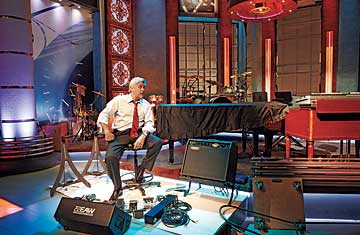
One challenge Leno, on his new set, faces is pleasing old fans without seeming to copy The Tonight Show.
(3 of 8)
The move would keep Leno from battling Conan (at least directly and on another network). It would be easier and cheaper than developing five separate hour-long shows. Above all, it fit Zucker's modus operandi. NBC in the Zucker era has been less successful at creating new hits than at strategically deploying old ones. Zucker gave us the supersized Friends, the fourth hour of Today, the two-hour Biggest Loser. What's still working at NBC? The Tonight Show? Why, then, NBC shall have two of them!
But the show also crystallizes an argument Zucker has been making about broadcast TV, that it can no longer afford to be run the way it used to be. Traditional network prime time--three hours a night of largely expensive, scripted comedies and dramas--evolved when the Big Three networks had the audience (and ad dollars) to themselves. Today, cable channels siphon off viewers. DVRs like TiVo, now in roughly a third of homes, make prime time any time and allow viewers to easily skip ads. Online TV--including Hulu, which NBC founded with Fox--is growing and convenient. It's also mostly free and does not deliver close to TV ad money.
This leaves broadcasters in the same spot as other old-media outlets in the digital age (like the magazine you are holding in your hands or perhaps reading for free online). People want the content, but it's harder to make a buck off it. And the recession hasn't helped. The "upfront" ad sales for the coming season netted an estimated 20% less than last year's did. "The world, for better or worse, has evolved," says Zucker. "If we don't acknowledge those changes, then we're going to totally get left behind." If they can't grow out of their problems--and audiences are shrinking every year--then they must cut their way out.
The former Big Three networks, in this view, are like the former Big Three automakers: 20th century behemoths burdened by legacy costs and business structures cemented during their baby-boom heyday. Their traditional armadas of dramas and sitcoms are like so many redundant product lines and vestigial tail fins. And The Jay Leno Show--free of large casts and five separate writing staffs--is the restructuring plan.
NBC's competitors' response: Speak for yourselves. To them, NBC is self-servingly spinning a collapse of its own making as a symptom of industry-wide problems. "It might be an accurate picture for them, but that doesn't mean it's an accurate picture for everybody," says Kelly Kahl, senior executive vice president of prime time for CBS, the top network in overall viewers. "We don't like being painted with the same brush." CBS will face off against Leno with the imposing likes of CSI: Miami, and right now, it likes its chances. "We have successful shows at 10. We dominate 10 o'clock. It's a good business for us now and a business with the potential to get better."
